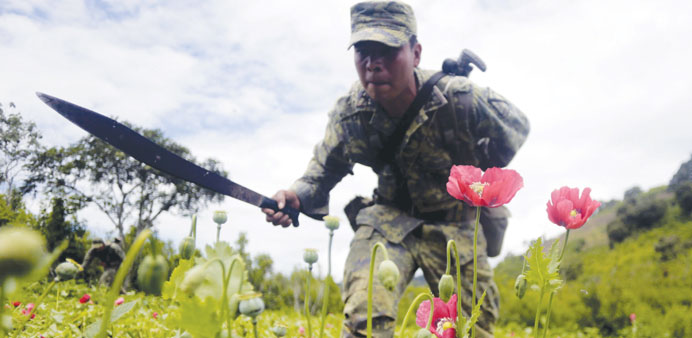Guardian News and Media/Mexico City
Mexican authorities are struggling to control growing numbers of small town vigilante groups which have taken up arms in the name of protecting their communities against organised crime after local and federal police forces have failed to keep them safe.
On Monday police in the town of Tixtla in the southern state of Guerrero were attacked and had their weapons taken by one such group. On Tuesday scuffles broke out when the army disarmed another group marching to demand the release of a recently arrested leader.
Also on Tuesday, sympathisers of a self-defence group in the mountain town of Aquila in the neighbouring state of Michoacan accused state police of killing two people after a mass arrest of the local “community guard”.
“The problem is getting worse and it is a serious matter,” said security expert Eduardo Guerrero, who closely monitors the dynamics of Mexico’s drug wars and government strategy. “It seems to me that the government does not have clear information from the field and that leads to ambiguity in the response.”
Increasing numbers of so-called self-defence groups have been formed across the country over the past year. They typically argue that they have no other option for limiting the abuses carried out by organised criminal groups that operate extortion and kidnapping networks backed up by extreme violence.
President Enrique Pena Nieto took office in December promising to implement a new strategy in the country’s raging drug wars. But although the government claims better co-ordination between different security forces has prompted a drop in the murder rate, violence remains extreme and on Tuesday Pena Nieto was forced to dilute plans for a new national police force to lead the struggle against the cartels.
Security forces have proved unable - and sometimes unwilling - to crack down on organised crime groups, prompting growing support in some areas for vigilante groups. But while many self-defence groups have grown out of local communities, some have themselves been accused of participating in criminal activities, or acting as front organisations for the cartels.
The particular circumstances triggering the formation of each vigilante group, their type and level of organisation, as well as the sophistication of the weapons they carry, vary greatly from place to place.
“Some are clearly authentic efforts by communities to protect themselves, but others appear to have been infiltrated by criminals (from rival cartels),” said Guerrero. He said the phenomenon also fed into divisions within communities, making for highly complex and explosive situations.

Mexican soldiers cut off poppy flowers during an operation at Petatlan hills in Guerrero state. Mexico is being whipped by a drug cartels war.
